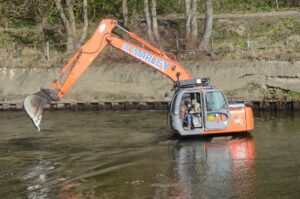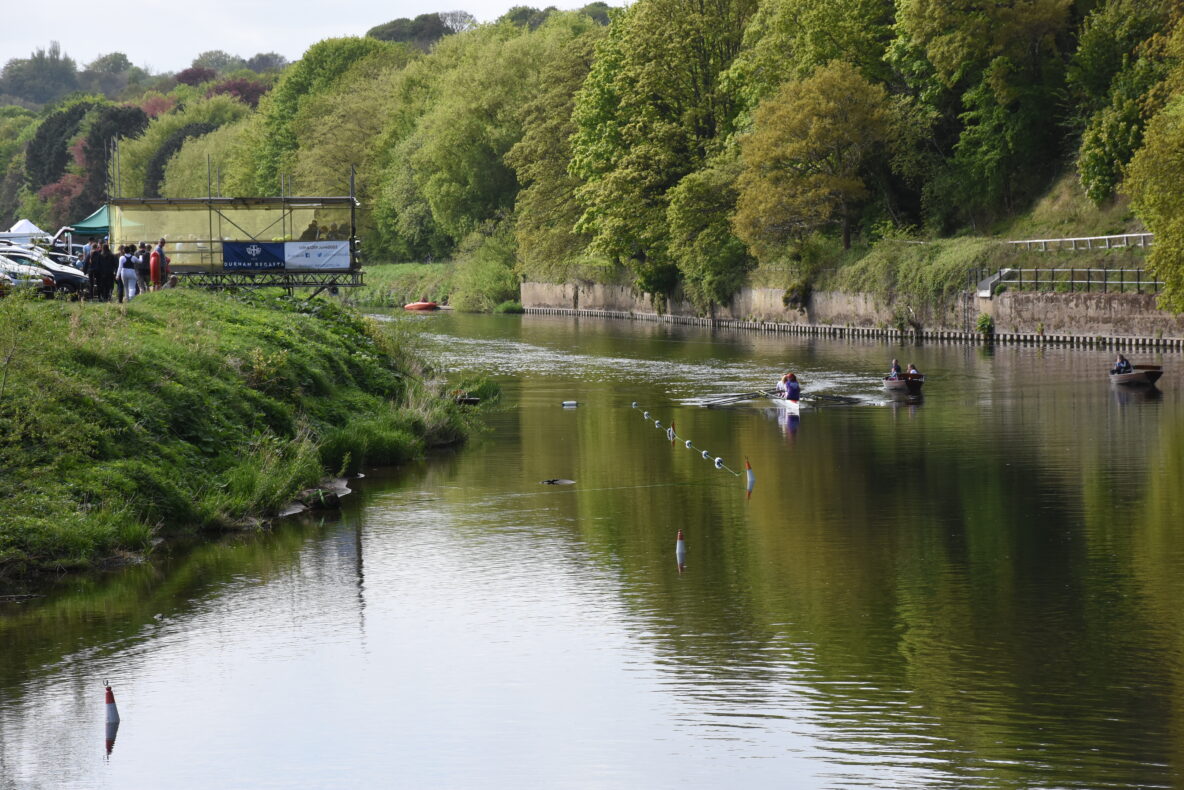A sufficient depth of water to accommodate racing and return lanes is a necessity for running a safe and successful regatta in Durham. To this end the Regatta has been striving for several years to arrange dredging to alleviate the ongoing accumulation of silt in the river.
It had been hoped to carry out dredging in the week prior to the 2023 Durham Regatta but for various reasons this was not possible. The Regatta was able to go ahead thanks to the efforts of a dedicated team of volunteers valiantly working in the river to manually redistribute the most intrusive shallows away from the vicinity of the start line and making the lower half of Durham ARC’s landing stage usable for small boats.
An extensive riparian survey was conducted during 2020 and following consultancy work costing around £25k a one-year permit was issued by the Environment Agency in December of that year that allows for a one-off capital dredge over a 250-metre section of the River Wear. Since that time the Regatta has been acting as the liaison organization for the main river users in Durham City in identifying a contractor to carry out the work, obtaining estimates for the likely cost and seeking sources of funding.
Thankfully the Environment Agency has been willing to grant extensions to the original permit until December 2022 and then again until the end of 2023. The permit stipulates that any work must be carried out between the beginning of June and the end of September to avoid any possible impacts on fish and their habitats during the spawning season.
Durham County Council and Durham University have each agreed to contribute 40% of the cost of dredging, capped at £25k each, and while discussions are ongoing with Durham Amateur Rowing Club (DARC) and other river users to source the remaining 20% of the cost, the Regatta has been using its reserves to move the project forward.
Reuben Smith who previously dredged the river in the 1990s has been identified as the contractor who will carry out the work, and it is proposed to dredge a depth of 70cm of material from the river over a 200-metre length downstream from DARC’s perimeter fence, and 50cm of material between the DARC fence to the Old Coal Yard.
Before any work can commence the contractor’s method statement must gain Environment Agency (EA) approval. However, after reviewing the statement that was produced 3 years ago the EA’s technical specialists in fisheries, biodiversity and geomorphology raised concerns regarding measures to reduce risks identified in the ecological assessments, particularly those relating to protected species, such as otters, badgers and bats, and requested further information on how such risks are to be mitigated.
With concerns mounting about the condition of rivers the method statement also needs to demonstrate how working methods will reduce sediment mobilisation and avoid pollution by tools or machinery. The presence of invasive non-native species should also be managed, and measures should be taken to protect breeding birds.
Slow communication and the need to provide much information has meant that dredging has been unable to commence.
Last summer British Rowing (the Governing Body for Rowing) representatives agreed to raise the issue as a concern at their regular meetings with the Agency, to which they pay a levy on behalf of clubs using EA maintained waters. Unfortunately, not being a navigation, the levy does not apply to the River Wear.
With the extended permit due to run out at the end of 2023 a further meeting with the EA took place last November, at which the EA’s response was that it would be better to carry out the work between December and May because of the lower risk at that time from a fisheries and water quality perspective, rather than between June and September as allowed by the permit. Further narrowing it down to avoid the migratory salmon season in October/November the preferred time would be between December and March, although March would raise concerns due to nesting birds.
The Regatta has asked for a revised permit from the EA that clearly sets out the dates when dredging will be permitted. Ecological consultants have been contacted for help in providing method statements, and a biodiversity survey is to be carried out so that any mitigations proposed can be integrated into the existing risk assessment. Further response from the EA has not as yet been forthcoming and the local MP has been approached to address the speed at which the EA has been responding.
Discussions are underway with the contractor and the Angling Club to identify methods of working that will minimise disturbance to the riverbanks, avoid changes to water quality and manage silt movement on the riverbed.
From the Regatta’s perspective it is essential for dredging to be effected before June. However, because of the ongoing delays and the proposed revision to dates this will not be possible. The constant delays are a great frustration.
A successful event and good weather last year means the Regatta is in a healthy position financially, but it still relies heavily on gate receipts. A corporate sponsor would help to cover the main costs and reduce the reliance on the local community. Potential sponsors can find information about sponsorship opportunities at https://durham-regatta.org.uk/be-involved/sponsors/ and can contact the Sponsorship Secretary at sponorship@durham-regatta.org.uk
The significant cost of dredging the river also needs to be considered. The Regatta is a non-profit making organization run by volunteers. It costs around £40k each year to run the Regatta, and as dredging will undoubtedly be required on a regular basis it may be beneficial to establish a reserve fund to ensure that future dredging costs can be met.

Moving sediment on the river bed in March 2014

